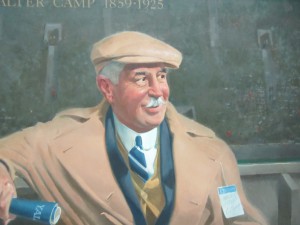On 6 November 1869, in New Brunswick, New Jersey, the Rutgers Queensmen[1] defeated the College of New Jersey[2] Tigers by a score of 6 to 4 in what is regarded as the first college football game ever played.[3] College football would remain a vastly different game from today’s version for the rest of the nineteenth century. The major differences in the game are accentuated in the diary of Harvard College graduate Edward Herbert Atherton of Worcester, Massachusetts, a work available in NEHGS's R. Stanton Avery Special Collections (Mss A 1665).
One significant difference between the game of football as Atherton knew it in the 1880s and the game we play today is the system of scoring, which his diary makes readily apparent. When describing a game which took place in October 1883, Atherton mentions the team gaining five touchdowns and scoring eleven points.[4] This system reflects the scoring developed by Walter Camp, the man considered the father of American football. Furthermore, only one of the touchdowns was scored from a position where a field goal could reasonably be kicked after the touchdown, showing that the point after the touchdown was kicked from where the ball crossed the goal line.[5]
In his entry for 11 October 1883, Atherton mentions a unique scenario showing yet another difference between the game of his era and the modern game. That day, a team of Harvard students was supposed to play a team from Chauncy Hall; however, only four men showed up for the opposing team. Instead of canceling the game, the Harvard men blindly picked eight men from the crowd to participate in the game, which the Harvard side won handily.[6] It is also noted that a man named Sands was selected as captain of the team prior to the game and the names of all of the players and the votes for captain were mentioned, providing researchers with names of those present.
On 30 November 1884, Atherton writes about witnessing a unique game. Some of his friends and teammates took part in a game of football played on ice skates in the local skating rink. He explains that the game consisted of 15-minute halves with seven men on each side. It was said that the ball was in play “as soon as it touched the floor,” which sounds similar to ice hockey, already in the process of its modern development in the 1880s. Atherton mentions that his father would not allow him to play, a request he seems to have obeyed.[7]
While football occupies a major portion of Atherton's diary, it is hardly the only subject he on which he writes. At one point, Atherton mentions witnessing a bicycle race on the [Boston?] Common at about 4 P.M. He was told by a friend that the race was about 100 miles in length and began around 6 A.M. The route through the Common was said to have been lined with bicyclists who were watching the race.[8]
The diary of Edward Herbert Atherton serves as a useful resource for researchers on Massachusetts in the 1880s. NEHGS members can review this diary to gain insight into Atherton's life and times.
Notes
[1] Now the Scarlet Knights.
[2] Now Princeton University.
[3] Michael MacCambridge, ESPN College Football Encyclopedia (New York: ESPN, 2005), p. 6.
[4] Edward Herbert Atherton, “The Diary of Edward Herbert Atherton” (NEHGS, Mss A 1665).
[5] Ibid.
[6] Ibid.
[7] Ibid.
[8] Ibid.
Share this:
About Zachary Garceau
Zachary J. Garceau is a former researcher at the New England Historic Genealogical Society. He joined the research staff after receiving a Master's degree in Historical Studies with a concentration in Public History from the University of Maryland-Baltimore County and a B.A. in history from the University of Rhode Island. He was a member of the Research Services team from 2014 to 2018, and now works as a technical writer. Zachary also works as a freelance writer, specializing in Rhode Island history, sports history, and French Canadian genealogy.View all posts by Zachary Garceau →
